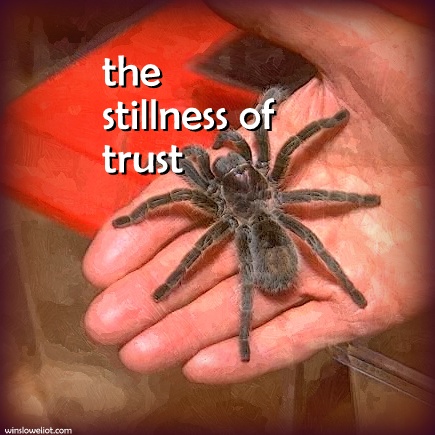
Stillness 12-18: I’ve been thinking a lot about trust—we may be finding ourselves in situations that require a lot of trust in ourselves and in others just now. It’s become a word that feels a bit weak, somehow implying that it’s better to be smart and know for sure than to trust. We tend to slide toward fear more slickly than we do toward trust.
It’s an interesting word, because originally it came from the Proto-Indo-European root of dreu or deru, which means “be firm, hard, solid.” Nothing flimsy or weakly hopeful about that! This became drowzdo, and as our language developed, the proto-Germanic roots of English turned it into traustaz, also meaning firm and strong.
It wasn’t until the 1200s or so that the word trausta began to infer “help, aid, shelter,” as well as “having confidence in,” and even “creating an alliance.” The Dutch troost and the German trost were words meaning “comfort, consolation.” Before long, trust began to imply “to have faith in.” Old English developed the word treowian (to believe) and treowe (faithful, trustworthy).
Within a few centuries the word had taken on business meanings, including a “legally entrusted property” as well as religious connotations such as a “trust in God.”
I was thinking about something I wanted very dearly, and my angels reminded me about the difference between hankering and trusting. I realized I was breathing shallowly and feeling anxious in my hankering. I consciously released the longing, letting it settle into trust that it would happen. Suddenly, I had a most amazing experience of shimmering golden flecks of light pouring down on me: which was not a revelation of a happy “ah, now it will happen you can trust that,” but a profoundly moving experience of “you can trust that whatever happens it’s okay. And if it doesn’t happen that’s okay.”
Trust, I learned, is the firmness and strength we feel in trusting utterly and loving what is and what happens next, no matter what that is.
So instead of hankering or longing, or judging or thinking something is not enough, try trusting that it is exactly as it needs to be, right now. Trust is a supreme form of mindfulness. It does bring great comfort because, like surrendering to the power of stillness, we can trust it. And I don’t see that trust is the opposite of fear, as some people say. Trust is strength: its opposite is feeling weak and frail. Trust gives us courage and power.
Want to know some other words with the same P-I-E root of dreu? Truth, truthful, trustworthy, entrust, true, truly … well, yes those all make sense. Truce. Betrothed. Endure. Yes, sounds good. But how about these words: ashtray, tar, tread, tree, trot, trough? Can we weave all these words into a poem about trust?
